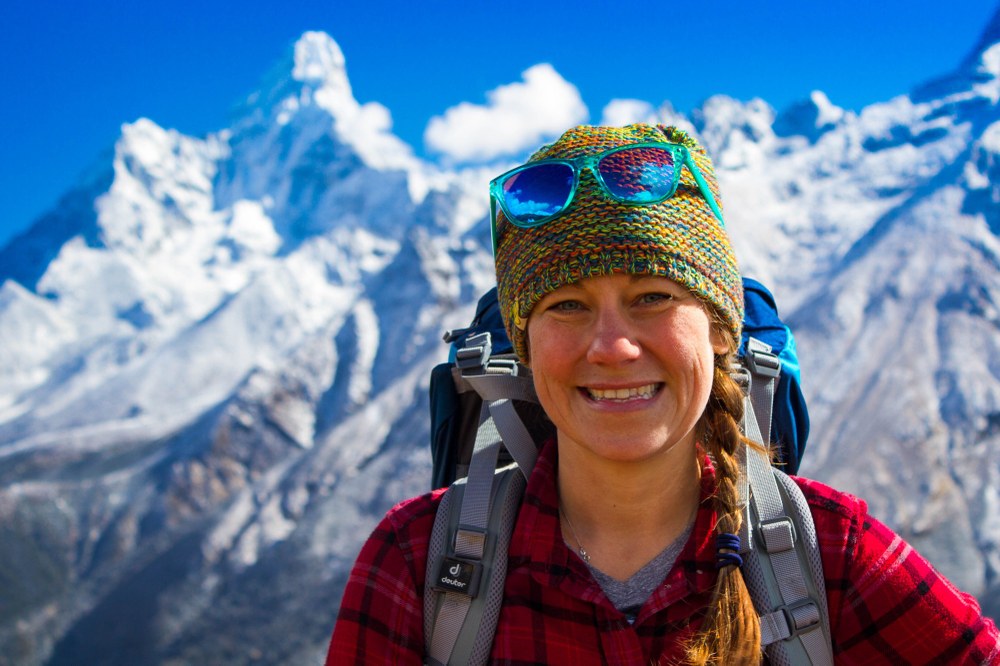
Given my strong family history, it’s not a matter of if I’ll get cancer, but when.
Almost every woman in my family has had cancer, and I’m working to come to terms with this near-certain reality. One thing I’m struggling with most is the anxiety around how a future diagnosis will affect my climbing. My mom started backpacking after she went through cancer treatments which gives me hope, but I am still grappling with questions about my own future.
Ida Kaller-Vincent is an 11-year Mountaineers member and a marine and wildlife biologist currently living in San Diego, California. She has been a Super Volunteer, key leader, and climb leader with the Seattle Branch since 2014. Ida is also a two-time lung cancer survivor.
When I reached out with questions about my struggles, Ida graciously agreed to talk to me about her own cancer journey. Hearing her challenges in her own words helped me work through my own anxiety. Everybody’s path is different, but after talking with Ida I am convinced climbing and recovering from cancer can coexist.
How did you get involved with mountaineering and outdoor recreation?
I've always loved nature. When I was a child growing up in Sweden, I went to forest school and spent the summers in the Baltic Sea. I first got into mountaineering when I moved to Seattle from Australia, where I'd been living. I did a lot of scuba diving in Australia, and at first I tried scuba diving in Seattle. I was like, no, thank you! It's way too cold. I figured that people in Seattle climb mountains and hike. So I signed up for The Mountaineers Basic Alpine Climbing Course.
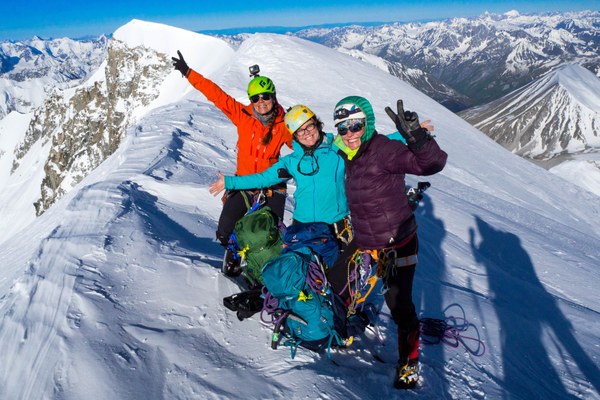 Ida Kaller-Vincent, Tammy Martin, and Liana Robertshaw on the summit of Mongolia’s highest peak, Khüiten Peak.
Ida Kaller-Vincent, Tammy Martin, and Liana Robertshaw on the summit of Mongolia’s highest peak, Khüiten Peak.
How did your cancer journey start?
It's strange. I've had cancer twice now, and both times I found out by accident. The first time I had been traveling in Africa. I came back and had the flu, but I thought maybe I had malaria. I went to the doctor who sent me for X-rays to check if I had pneumonia. The scan found something in my lung. They did a biopsy and found out it was cancer, which was quite shocking. I didn't anticipate that at all. I didn't even think that people my age got lung cancer. It didn't feel real.
It was tough to tell my mom and my close friends. My biggest concern was telling people and having to make them sad and worried. I wanted to protect them from that burden. When I was sick and I didn't know what was going to happen, I wrote many letters to many people because I just wanted them to know they were loved; so that if I didn't make it, they would know how much I loved them.
When you started the treatment, what were your biggest challenges and how did you deal with them?
The most challenging thing was the chemo and radiation. I had them both at the same time. I would have radiation every single day and every couple of weeks I'd have a chemo treatment.
When you are in the hospital getting your treatments, you have a bag that says “Biohazard” that's infusing fluids into your body, and you're like, well, this doesn't seem right! I felt healthy, and then suddenly, I started treatment and felt like I was dying. Chemo makes you feel so sick that you want to jump out of the window just to make it stop. It felt like there were worms in my brain. I had a tough time swallowing, and my chest was burning. My fingernails started to separate from my fingers. You can't do anything and you're seeing your body deteriorate.
It gives you this feeling of helplessness, and it's hard to wrap your head around what's happening. I couldn't do anything and had to tell my brain to just endure.
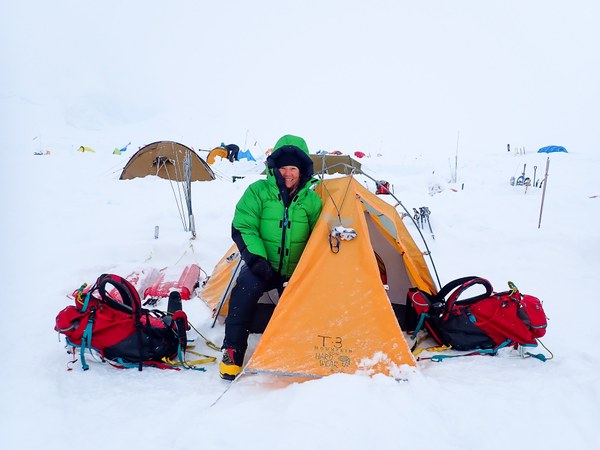 Ida at Denali, Camp 2.
Ida at Denali, Camp 2.
That feeling of uncertainty…
Yeah, even after you recover, there's always a fear that you don't have a future. I only started planning for the future six months ago, because I don't know if the future is out there. It is a weird space to be in, but I like to remind myself that no one knows; a car accident can end everything too.
How was it to suddenly go from having every weekend planned to putting an indefinite pause on everything?
The first time I had cancer, they took out a quarter of my lung. I didn't know what that meant and I remember talking to my surgeon and asking him, can I go to high altitude after this? Can I scuba dive? He said that usually his patients ask if they can go back to playing bingo (because they are generally not in my age group). So he didn't know. Being in outdoor spaces is my meditation. Not being able to have that was very hard, especially when I needed it the most because of all the stress.
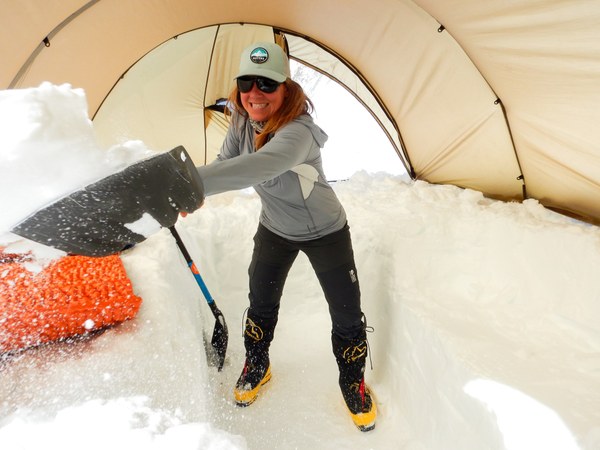 Ida building a snow kitchen in Mount Denali, Camp 3.
Ida building a snow kitchen in Mount Denali, Camp 3.
Did you receive any comments or suggestions that you found more hurtful than helpful?
I think one thing that's been hurtful (or maybe not hurtful, but difficult) was how some people would say "you're so strong, you're gonna be fine." That puts it on you! If you die or you're not fine, that means you weren't strong and it's your fault. This isn't something anyone can control. People would say you're such a positive person, you'll be fine. And I thought that didn't mean anything. It doesn't matter how strong or positive I am. Cancer can just kill me.
I also had a lot of people who wanted to give me remedies and advice, which was not something I necessarily wanted. Then at some point, I decided that no matter what advice I got or what anyone told me, I was just going to accept that it came from kindness and that they were trying to help. I didn't know the right thing to say, so how could anyone else? That changed the way I thought about it. If anyone reached out, it meant they were thinking of me. It doesn't matter what advice they gave and whether I agreed with it.
What support did you receive that you appreciated the most?
People being there for me; my husband, family, and friends. I had a lot of friends flying over from Australia to stay with us. Just having people there was really helpful. They took turns babysitting me and bringing me the food I could eat. It was also great knowing it didn't all fall on my husband. It's hard to consider other people when you're feeling sick. But they are also hurting, dealing with it, and trying to work it all out. Having a network of support was extremely helpful.
It was also very helpful to talk to a few people that had gone through cancer. Someone I met through The Mountaineers reached out to me and mentioned that her wife had gone through cancer. I spoke to her, and that was incredibly helpful, and made me feel less alone.
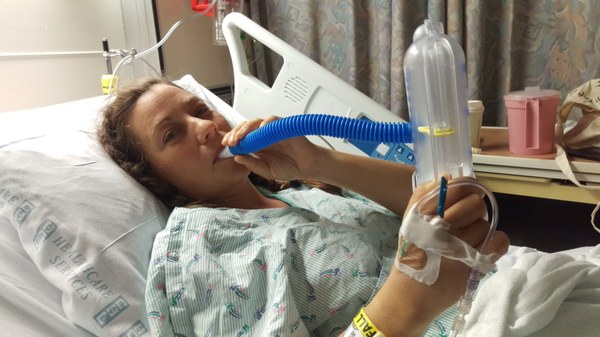 Ida after lung surgery at Virginia Maison Hospital, Seattle.
Ida after lung surgery at Virginia Maison Hospital, Seattle.
If you could go back in time, what advice would you give yourself that might make the process easier?
Unfortunately, I had the painful experience of getting a do[1]over because the cancer came back. But I don't know that you can do anything to change what it feels like. It's a shock. Each time! Even though I already had cancer once before, and you would think it shouldn't be a big surprise, it still was. I think back, and I could not have done it without my husband, friends, and family. I think it's about allowing people to be there for you.
What were the thoughts and emotions you went through when the cancer came back?
It was pretty rough. When the cancer came back two years later, it came back much more aggressively. This time they gave me a 60% chance of survival. That was a lot worse than the first time. I thought, wow, I might not make it. What do I want to do with the time I have? And what can I do?
It's been a little more than two years since my last treatment. I feel good, and there are no signs of recurrence so far. But it's hard not to worry every time I feel unwell.
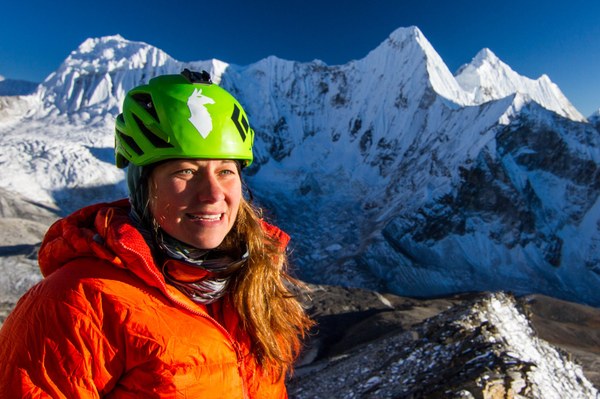 Ida at Ama Dablam, Camp 1.
Ida at Ama Dablam, Camp 1.
Going through all of that must have been traumatic, and losing lung capacity adds more complications. How did you restart mountain trips after treatment?
After the first cancer, my climbing friends and I planned an all-female expedition trip to Ama Dablam in Nepal to get me back out there and give me a reason to train. Back then, even hiking Kite Hill in Gasworks Park felt like an achievement. But I had something to work toward, and having a goal and friends to support me was really helpful. Because my lung capacity is reduced, I never returned to the strength I had prior to the surgery, but I got pretty close.
The second time, the radiation caused a lot of scar tissue in my chest, making it much more difficult to breathe. Now I am slower than I used to be, and I'm coming to the realization that I'm never going to be what I was.
A few weeks after I finished my last radiation and chemo, my husband and I scrambled to the summit of Mount Langley at 14,042 feet. It took me so long. That was maybe a little too much only a couple of weeks after chemo and radiation treatments. But I'm pretty bullheaded. The first year after those treatments there were some trips where I felt great, and there were some where the altitude really slowed me down.
I had one backpack in the Sierra, maybe only to 12,000 feet. I was so slow and couldn't breathe or catch my breath. And then two weeks later we climbed Mount Williamson (the second tallest peak in California at 14,379 feet) and I felt fantastic. Some days are good, and some are bad.
This year I attempted to climb Denali, and it was the first time I did a guided climb. My husband is double my size, yet we were required to carry the same weight. When I couldn't keep up with the [guide’s] pace despite being close to the summit, I was told to turn around. I was angry. I knew I could do it. I felt good, and I knew my body. I was just a little bit slower and breathing a little heavier.
But even though I didn't get to the summit, I still loved every bit of it. I was angry about having to turn around, but in hindsight it was a grand adventure and I think that's the lesson I'm taking from it. I still want to go and attempt these expeditions, and maybe I don't make it, but that's okay because the process and the adventure are what make it exciting.
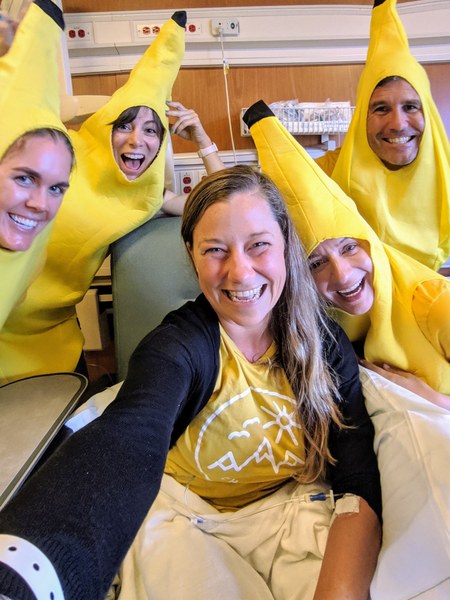 During one chemo treatment at UCSD hospital, San Diego. (Left to right) Katie Spahr, Liz Johnson, Ida Kaller-Vincent, Madeleine Pierce, and Matthew Kaller-Vincent.
During one chemo treatment at UCSD hospital, San Diego. (Left to right) Katie Spahr, Liz Johnson, Ida Kaller-Vincent, Madeleine Pierce, and Matthew Kaller-Vincent.
Denali is at an altitude many people with full-capacity lungs can't even think about. How do you get the courage to continue traveling internationally and to high altitudes?
I don't think it's courage because I'm scared often. Having cancer and realizing how precarious life is and how it can begone in a second makes you want to live life to the fullest. I was already in the philosophy of “you gotta live in the moment,” and then this happened and pushed it even further. I'm not fearlessly brave, but I don't have time to let that fear affect my life. We only get one shot. It's a gift to live and do these things. I often reflect on how fortunate I am that I was born in a country where I have these opportunities. I guess that gives me the courage to go out and do things even though I'm scared.
What advice do you have for someone who's going through a similar journey?
I think that it's incredibly scary and, at times, incredibly hopeless. But you are stronger than you think. As humans, we are more resilient than we give ourselves credit. We can only do our best, try and be there for each other, and be kind and understanding. Particularly in the mountaineering world there is a lot of ego. But we don't know each other's journey. When I'm out in the mountains, people don't know that I'm missing a quarter of my lungs and that's why I'm going slower and breathing hard. We don't know everyone's backstory. So we need to be a little kinder and a little more accepting.
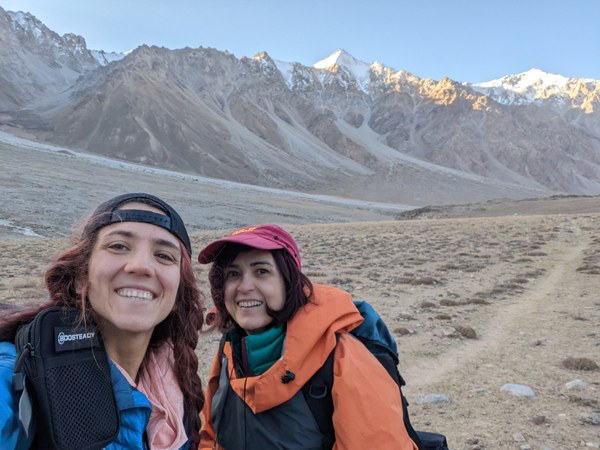 Kiana and her mom backpacking in the Pamir Mountains Range, Tajikstan. Photo by Kiana Ehsani.
Kiana and her mom backpacking in the Pamir Mountains Range, Tajikstan. Photo by Kiana Ehsani.
In addition to her work as a biologist, Ida Kaller-Vincent (@alpineida) is a published author of a novel and children’s book, Siggi the Sasquatch, and has produced and directed two documentary films. She was also featured on the cover of Mountaineer in fall 2016. Kiana Ehsani is a 2-year Mountaineers member and Super Volunteer, and has been featured in the fall 2021 issue of Mountaineer for sharing how her experiences as a young climber in Iran brought her to a leadership role with The Mountaineers.
This article originally appeared in our spring 2023 issue of Mountaineer magazine. To view the original article in magazine form and read more stories from our publication, visit our magazine archive.
 Kiana Ehsani
Kiana Ehsani